UPDATED July 23, 2023: I credit taking supplements for staying healthy during the last year or so of my running. Running can be hard on the body and it can cause imbalances and deficits that impact your overall performance and health. Along with a healthy diet and good sleep, supplements can help you maintain a balance so that you can run and be your best.

I have taken various supplements to help me regulate certain issues or maintain balance when my training demands are high. Since training more intensely this past year, I began taking Previnex supplements and truly believe in their efficacy.
Therefore, I mention some of their supplements for runners and athletes below plus include a code for 15 percent off (TMR15) on your first order (And, you get your money back if you aren’t happy.) I don’t recommend products unless I have vetted them and believe in them. The dietary supplements industry is dirty and predatory–you have to be careful with what you put in your body. For this reason, I do not give this recommendation lightly. It’s been highly vetted.
Before I round up the best supplements for runners, I have several caveats. In this article, I will cover:
- do runners need supplements
- 6 tips for taking supplements
- should runners take creatine? What about protein?
- plus the 13 best supplements for runners
Also note, I am not a doctor. If you have a question about whether you should take a dietary supplement, talk to yours!
Let’s get going!
Do runners need to take supplements?
No, runners do not need to take dietary supplements unless prescribed by a medical professional. If you aren’t feeling or running well, then it is time to get your blood levels checked as well as a lifestyle assessment (e.g. are you sleeping and eating well?).
I recommend getting your levels checked annually or biannually! This is especially if training hard and/or you recently had a baby. It is often a domino effect in which if one thing is off, everything else gets out of whack.
That was my story, which I write about here.
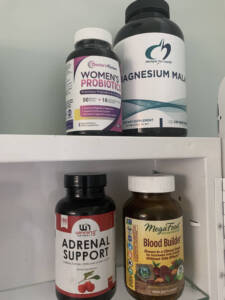
I do not recommend taking dietary supplements unless you know for certain there is a need for them. I have over-supplemented with both Vitamin D and Iron in which my levels were near toxic levels and overly taxed my liver.
In this case, a doctor told me to take these supplements, missed my recheck, and therefore did not adjust the level I was taking, leading to over-supplementation.
Related: Free Training Plans for Runners
What supplements should runners take?
There are several dietary supplements that runners can take to keep their hormones and vitamins in balance. The common supplements for runners include iron, vitamin D, protein, and magnesium.
Again, it is not advised to take supplements unless directed by your doctor.
Related: How to Tell if a Supplement is Good Quality
Here are 6 tips for taking supplements for runners:
- Do a blood draw. Get lab work done to know your baseline. Heed your doctor’s advice on what to take. Try to find a doctor that understands the demands of being a runner.
- Do your research. Make sure the supplement will meet your needs and is backed by science.
- Get your vitamins from food. Try to get your vitamins and nutrients from food the best you can rather than relying on a supplement. Getting nutrients from real, whole foods is best for absorption and efficacy.
- Maximize your sleep. Before you start popping pills because you’re tired or your performance has plateaued, look at your sleep and make sure you’re getting enough. Sleep is the foundation for everything you do—and lack of it can also throw your levels out of whack!
- Buy from a reputable seller. Supplements are not monitored by the FDA, therefore a lot of counterfeit supplements can be sold, even on major retail sites like Amazon. Chances are your doctor has an online store you can purchase through. If you purchase from a site like Amazon, make sure it is a reputable seller!
- Get regular bloodwork. Getting your bloodwork done every 6 months will keep your levels in check. You can get bloodwork done at your doctor’s (be sure to get a full panel including hormone, iron, vitamin B and D levels, and ferritin).
You can also get bloodwork done through InsideTracker at a discount. InsideTracker is awesome because they offer panels specific to your lifestyle (e.g. an athlete or mother runner) and research-backed daily actions to optimize your performance and health.
Related: Running on No Sleep: Do or Don’t?
Should runners take protein?
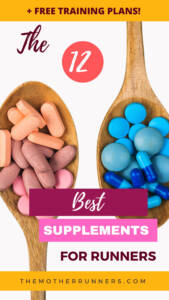
Yes, runners should take protein after their runs. Protein is the best recovery supplement for runners especially after a long run, race, or intense track workout.
It is vital for recovery in that it aids in rebuilding muscle tissue after the stress of running. Protein is the best macronutrient to prevent muscle breakdown, also known as catabolism.
Related: The 4 Best Protein Powders for Runners
Many runners are low in protein intake. Runners should aim for about .8 to 1 gram of protein per pound of body weight per day. Get a boost post-run from a smoothie with protein powder.
You’ll see protein makes my top ten supplements runners should take below.
Related: Does Running Cause Hormone Imbalances?
Should runners take creatine?
Runners of shorter distances may find a performance boost by supplementing with creatine. Research shows the amino acid essential for muscle building can help build strength and enhance recovery, thereby helping your improve your athletic performance.
It can also boost glycogen replenishment which is important for long-distance runners.
However, the research is still limited and therefore I do not include creatine in my list of the best supplements for runners.
Related: Should Runners Take Creatine?
What supplement helps reduce lactic acid?
Supplements such as beta-alanine can help reduce lactic acid.
Lactic acid is a byproduct of intense exercise. It is that burning, heavy leg feeling that torpedo your workouts and the whole reason why we do tempo runs to push our lactate threshold (lactate combines with hydrogen to make lactic acid).
Related: What is a Tempo Run?
Beta-alanine, an amino acid not used in protein synthesis but converted into carnosine, acts as a buffer to reduce lactate buildup. Research shows this can improve performance, shorten recovery, and prevent fatigue.
Beta-alanine is included in my top ten supplements for runners below.
Related: Healing Foods: What Foods Help Heal Injuries?
Top 13 Best Supplements for Runners
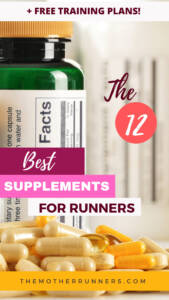
Okay, now finally to my top ten best supplements for runners. These supplements for runners made the cut because:
- They address common deficiencies in runners, and/or
- They are backed by science to improve athletic performance.
And, at the risk of bludgeoning a dead horse, consult with your doctor, get your bloodwork, etc. before taking these!
Ok, let’s go!
Related: 7 Marathon Recovery Tips to Recover Faster
Iron
Iron deficiency in runners is very common and one of the main culprits behind poor athletic performance. That’s because it is vital for making hemoglobin, a protein in red blood cells that help carry oxygen to your working muscles.
Runners lose iron each time their foot strikes the ground in something called hemolysis. We lose iron in our sweat. And, women lose iron every month through menstruation.
Related: The Danger of Low Iron in Runners
Studies show that runners low in iron will run slower and have low energy levels. Personally, I discovered I had incredibly low iron and ferritin (iron stores) after my workouts kept tanking. I started taking an iron supplement, eating more iron-rich foods, and cooking in a cast-iron pot to raise my iron levels.
I recommend getting bloodwork on your iron levels regularly and supplementing with a supplement such as MegaFoods’ Bloodbuilder which doesn’t upset the stomach and includes vitamin C for better absorption. Be sure not to take with calcium-rich foods or with your coffee as that blocks absorption!
Related: A Guide to Race Day Nutrition
Immune Health Supplement
Getting sick during a marathon training cycle STINKS. Not only do you feel bad, but you also have to take time off running and rebuild. I have gotten significantly fewer illnesses from my kids since taking Previnex’s Immune Health PLUS which contains immune system activators beta-glucans. (Save 15 percent with code TMR15.)
- Studies show that beta-glucans trigger a cascade of events to make your immune system more efficient, effective, and powerful.
- In addition to beta-glucans, studies show that vitamin C and Zinc can help shorten colds.
- Taking vitamin D can also help you get healthy and stay healthy, studies show.
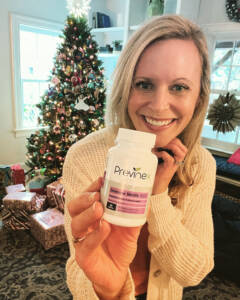
Related: 9 Healthy Habits to Avoid Getting Sick this Winter
Omega 3 Fatty Acids
Omega-3 fats (DHA and EPA) are needed for the maintenance of brain and heart function, and vision. For runners, these fatty acids have anti-inflammatory benefits, particularly for cardiovascular health and function. Omega 3s have been found to improve oxygen uptake, reduce delayed onset muscle soreness (aka DOMS) and increase blood flow to the muscles during our runs.
Personally, I have felt these benefits since taking Previnex’s Omega Plus supplement. Despite higher training intensity and volume, I am able to endure faster paces than before and recover faster from hard workouts and long runs. Previnex’s blend is ultra clean and pure. Save 15 percent with code TMR15.
Related: How to Prevent Iron Deficiency in Runners
Vitamin D
More than 75 percent of the population is deficient in Vitamin D, and about that many of runners who average at least 20 miles a week are low in the vitamin.
Related: What to Eat During Your Period
This is a problem as Vitamin D is important for body processes such as signaling gene response, protein synthesis, hormone synthesis, muscle tissue function, immune response, plus, cell turnover, and regeneration.
You can get vitamin d from exposure to sunlight and in your foods such as Vitamin-D fortified milk, cheeses, cereal, and in many fatty fish.
Talk to your doctor before supplementing with Vitamin D but the baseline recommended amount is 400 IUs for those under 70. I like to use Vitamin D drops.
Joint support
If you are over 40 and running, then I cannot recommend a joint support supplement enough. Even though I have resumed running after an almost two-year hiatus due to running injuries at a higher intensity, I am feeling better than ever. The usual aches and pains in my joints that I used to get with returning to training are gone.
I think this is in huge part to taking Previnex’s Joint Health supplement which is clinically proven to help your joints feel better in as little time as a week. How? Its main active ingredient NEM®, is clinically proven to reduce joint pain, joint stiffness, and improve joint flexibility in 7-10 days, and clinically proven to protect joint cartilage from breakdown during exercise.

NEM® is clinically proven to be up to five times more beneficial than glucosamine and chondroitin alone or in combination. Previnex’s joint supplements also contains Boswellin®, a powerful, natural, and clinically proven anti-inflammatory and pain reliever that provides additional support for joints. Save 15 percent with code TMR15.
Many of my athletes have started taking the Previnex Joint Health Plus supplement and noticed a huge difference, even in arthritic knees!
Related: Can Collagen Prevent Injuries?
Protein
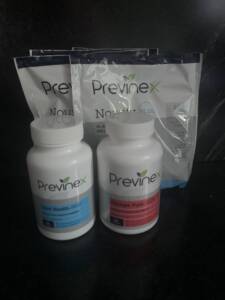
All runners need to take protein to help them recover from their runs. (This is the one supplement I do not advise you talking to your doctor first.)
Take in protein to help your muscles repair the micro-tearing created by running so that your muscles recover faster and build back stronger.
You can take in protein after your run from real food such as meats, nut butters, eggs, or cheese. I recommend this first.
If that isn’t realistic for you, you can make a protein smoothie or grab a protein bar. Gnarly whey protein powder is my absolute favorite for taste, digestion, and efficacy. Fairlife milk also packs 30 grams of protein.
Aim to have .8 to 1 gram of protein per pound of body weight a day. Get that protein in within an hour of a run lasting longer than an hour to start the rebuilding process!
Related: Marathon Fueling 101: How Runners Should Eat
CoQ10
A CoQ10 (Coenzyme Q10) supplement could be a performance enhancer.
CoQ10 is an antioxidant molecule found in our cells that help with energy production and the prevention of cell damage.
Studies show that CoQ10 can increase the time it takes to reach exhaustion, thereby enhancing running performance.
Other research shows that CoQ10 supplementation of 60–100 mg a day for 4–8 weeks improved aerobic power, anaerobic threshold, exercise performance, and/or recovery after exercise.
While CoQ10 is like a fat-soluble vitamin, it’s tough for our bodies to absorb it, so it’s best to supplement.
Beta-alanine
Beta-alanine can help provide a buffer from the lactic acid our bodies create when we push our limits.
Our bodies use lactate for glucose breakdown for energy but when it combines with hydrogen, it creates lactic acid which causes our muscles to burn and feel heavy.
Studies show a beta-alanine supplement can help reduce the lactic acid in our muscles thereby delaying fatigue and enhancing performance.
Related: 6 Best Nutrition Products for Mother Runners
Beet Root
Beets, you can’t beat ‘em! Study after study is touting the benefits of beets, including faster race times, improved efficiency, and better endurance.
How? Your body breaks down beet root into nitric oxide which is a neurotransmitter that improves nerve singling and blood vessel dilatation. In other words, it helps your body work together better (running economy and efficiency) and improves oxygen flow.
You can take beet root shot before a race for a nice shot at a PR or every day to boost your overall training—or both!
Ashwagandha
An ashwagandha supplement is an adaptogen, an herb, plant, or mushroom that is thought to help our bodies deal with stress. Ashwagandha has been shown to improve the maximum rate of oxygen consumption (VO2max) during exercise, thereby improving running endurance capacity.
There are lots of adaptogens that claim to have benefits for increase in energy, decrease in stress and fatigue, and overall better health.
However, ashwagandha has many studies that indicate it can help boost running performance.
Probiotics
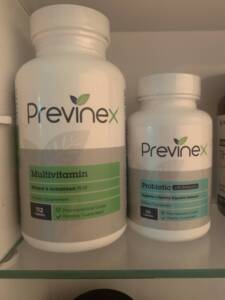
Probiotics, beneficial bacteria for our gut, are another supplement that I advise all runners to take (as a running coach, not as a doctor since I am not one!).
A healthy gut is ground zero for overall health and especially important for endurance athletes who need strong guts to go the distance. A healthy gut also ensures that you are absorbing and utilizing all the nutrients you are getting from your supplements and foods!
Get a good quality probiotic (not a cheap one) and cycle out the brand every three months or so.
I really have noticed a difference with my Previnex probiotic because they have rigorous sourcing and manufacturing standards that most supplement brands do not have. It also has a clinically proven prebiotic, NutraFlora®, that enhances the growth and colonization of healthy bacteria in the gut. Save 15 percent on your first order of Previnex supplements with code TMR15.
Related: How to Train Your Gut
Magnesium
Magnesium is a mineral crucial for the conversion of glycogen into glucose which runners use to fuel our running. Because of the stress runners put on our bodies—and the demands of magnesium for energy production, we may need more magnesium than the general population.
Without enough magnesium, we are at risk for lactic acid building up, muscle soreness and spasms, and fatigue. Magnesium is also important for muscle contraction and strong bones (for prevent stress fractures).
You can find magnesium in foods such as nuts, dark chocolate, avocados, tofu, and fatty fish. If blood levels indicate you’re low in magnesium, you can supplement your diet with a magnesium supplement.
A post-run Epsom salt (magnesium sulfate) bath can also boost magnesium levels and recovery. In my experience, it is ALWAYS a good idea to take an Epsom salt bath!
Adrenal Support
Runners and athletes are at risk of adrenal fatigue. Your adrenal glands make hormones such as cortisol which help your body handle stress. If your body is under too much stress (including mental, emotional and physical), it can’t produce enough hormones to meet its need.
You may feel fatigued, moody, or have difficulty sleeping, among other symptoms. Again, a blood test can get your hormone levels.
An adrenal support supplement plus measures to help you handle stress such as meditation, mindfulness, a reduction in running volume or intensity, walks, yoga, and sleep, can help you maintain healthy hormone levels.
It’s recommended to take a break for a week or so from all supplements every quarter.
Couple these supplements with a multivitamin (such as Previnex or New Chapter) but be sure you look at the complete dosage of each supplement to ensure you aren’t taking too much. Many of these supplements include more than one nutrient so cross-reference your bottles!
If you want guidance with your running goals, including run/walking goals, check out my run coaching services. Also, be sure to check out my free training plans:
- Postpartum Training Plan
- After a Break Training Plan
- 5k Training Plans
- 10k Training Plans
- Half Marathon Training Plans
- Marathon Training Plans
- Strength Training Plan
